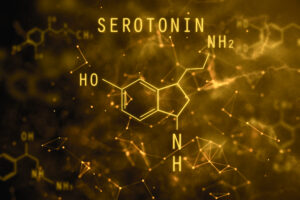The neurotransmitter serotonin is best known for its role in regulating mood, but it has a much wider impact on cellular function beyond just helping nerve cells communicate. When it comes to serotonin and cellular health, research has shown that serotonin plays many important roles, especially in relation to free radicals, oxidative stress and how the mitochondria within the cells function. Understanding these intricate interactions and the impact of serotonin on cellular health can provide valuable insights into various health conditions and open pathways for innovative treatments.
What is Serotonin?
Serotonin (5-hydroxytryptamine, or 5-HT) is a neurotransmitter most well-known for its role in the regulation of mood, emotions and cognitive function. Although it is often associated with the brain, serotonin is also found throughout the body, particularly in the gastrointestinal tract and blood platelets. In addition to its well-known effects on mood and emotional well-being, serotonin plays a vital  role in maintaining overall physiological balance. It influences various bodily systems, including the digestive system, where it helps regulate bowel movements and function. Serotonin’s presence in the blood platelets is crucial for hemostasis (the process that prevents and stops bleeding), as it helps with blood vessel constriction and wound healing.
role in maintaining overall physiological balance. It influences various bodily systems, including the digestive system, where it helps regulate bowel movements and function. Serotonin’s presence in the blood platelets is crucial for hemostasis (the process that prevents and stops bleeding), as it helps with blood vessel constriction and wound healing.
While serotonin’s primary function is to regulate mood, digestion and sleep, emerging studies highlight the critical role it plays in cellular health, particularly in relation to oxidative stress, mitochondrial function and neural signaling. This reinforces the importance of this important compound in processes other than simple neurotransmission.
The Antioxidant Role of Serotonin
Oxidative stress occurs when there is an imbalance between the production of free radicals and the body’s ability to neutralize them with antioxidants. Free radicals are highly reactive molecules that can damage cellular components, including lipids, proteins and DNA. Chronic oxidative stress is associated with various diseases, such as cardiovascular issues, neurodegenerative disorders and cancer. Free radicals are substances that are produced naturally when cells use energy, especially during the process of mitochondrial respiration. While they play important roles in cell signaling and immune responses, excessive levels can lead to oxidative damage. A delicate balance is essential: Low levels of free radicals can have beneficial effects, while high levels are associated with cellular aging and degeneration.
Research has uncovered serotonin’s powerful antioxidant properties, specifically its potential to neutralize free radicals. This ability is crucial for preventing oxidative damage at the cellular level. Unlike traditional antioxidants like vitamins C and E that directly neutralize free radicals, serotonin works by influencing different biological pathways to strengthen the body’s overall ability to fight oxidative stress. Studies indicate that serotonin can also influence the expression of genes involved in the antioxidant response. For instance, it may boost the production of critical enzymes like superoxide dismutase (SOD) and glutathione peroxidase, which provide extra protection against oxidative stress. This regulation is particularly significant in tissues prone to oxidative damage, such as neural tissue.
The connection between serotonin and oxidative stress has important clinical implications. For example, conditions marked by oxidative stress, like depression, have been associated with serotonin dysregulation. Patients with major depressive disorder often show elevated oxidative stress markers, suggesting that increasing serotonin levels could offer dual benefits: enhancing mood and reducing oxidative damage.
Mitochondrial Function and Serotonin
Mitochondria, often referred to as the “powerhouses” of the cell, are responsible for producing adenosine triphosphate (ATP), the energy currency essential for various cellular processes. Besides producing energy, mitochondria are also important for controlling cell death (apoptosis), maintaining calcium levels in the cell and producing reactive oxygen species (ROS), which are molecules that can help with cell signaling but that can also cause damage if too many are produced.
Interestingly, serotonin is not only a product of neurons; it is also synthesized in mitochondria. This reveals a unique connection between serotonin levels and mitochondrial health. Proper mitochondrial function is vital for maintaining adequate energy production and reducing oxidative stress. Disruptions in serotonergic signaling can impair mitochondrial function, resulting in decreased ATP levels and increased oxidative damage. Mitochondrial dynamics such as fusion (the joining of mitochondria) and fission (the splitting of mitochondria) are crucial for cellular health. Dysregulation of these processes can diminish mitochondrial function and elevate oxidative stress. Serotonin may help regulate these processes, potentially supporting optimal mitochondrial function and overall cellular health.
Serotonin’s role in how mitochondria work is particularly important for neurodegenerative diseases like Alzheimer’s and Parkinson’s, which often involve problems with mitochondria and oxidative stress. Boosting serotonin levels might help improve how mitochondria function and reduce oxidative damage, potentially leading to better management of these challenging conditions.
The Interplay Between Serotonin, Free Radicals and Oxidative Stress
 Serotonin also helps to keep the production of free radicals in balance by affecting cellular signaling pathways. This helps control the activity of enzymes that either produce or remove free radicals, protecting cells from oxidative damage. Maintaining this balance is especially important in active tissues like the brain and muscles, where free radicals are produced in larger amounts.
Serotonin also helps to keep the production of free radicals in balance by affecting cellular signaling pathways. This helps control the activity of enzymes that either produce or remove free radicals, protecting cells from oxidative damage. Maintaining this balance is especially important in active tissues like the brain and muscles, where free radicals are produced in larger amounts.
In the nervous system, serotonin’s ability to regulate oxidative stress is essential for neuron health. Neurons are especially vulnerable to oxidative damage due to their high metabolic demands and relatively weak antioxidant defenses. This vulnerability places them at greater risk for neurodegenerative diseases, where oxidative stress is a key factor in disease progression. Serotonin can boost the production of protective factors and antioxidant enzymes that help shield neurons from oxidative stress. Studies have found that serotonin can raise levels of brain-derived neurotrophic factor (BDNF), which helps neurons survive and encourages the growth of new neurons. BDNF also has antioxidant properties, providing extra protection against oxidative damage to neurons.
Changes in serotonin levels have been linked to neurodegenerative disorders like Parkinson’s and Alzheimer’s diseases. Research suggests that problems with serotonin and oxidative stress contribute to these conditions. Increasing serotonin levels through treatment might help lower oxidative stress, improve how neurons function and slow down the progression of these serious diseases.
Cellular Signaling and Neurotransmission
Serotonin is crucial for neurotransmission, the process that allows nerve cells to communicate with each other. It plays an important role in synaptic plasticity, which is the ability of synapses (the connections between neurons) to strengthen or weaken over time. This adaptability is essential for learning and memory because it helps the brain store and retrieve information. Healthy serotonin signaling supports cognitive function and overall brain health. At the cellular level, serotonin regulates various pathways that influence how neurotransmitters—chemical messengers—are released and how sensitive receptors are to them. This regulation improves communication between neurons, especially in areas of the brain involved in mood, thinking and memory.
One of serotonin’s key roles is maintaining a balance between excitatory signals (which stimulate activity) and inhibitory signals (which calm activity). By managing neurotransmitter levels, serotonin helps prevent excitotoxicity, a condition where neurons become damaged from excessive stimulation. This is often linked to oxidative stress, making serotonin’s modulation of synaptic activity vital for protecting neurons from degeneration.
Serotonin also helps neurons adapt to changes in the environment, especially during learning. When serotonin levels are increased, it strengthens synapses through a process called long-term potentiation (LTP), which is important for memory formation. Additionally, serotonin works with other neurotransmitter systems, forming a complex network that affects emotions and thinking. This interaction is crucial for managing emotions and making decisions, underscoring the overall importance of serotonin for health.
Serotonin is vital for cellular health because it helps with communication between nerve cells and makes neurons more resilient. By encouraging flexibility in synapses and keeping signals balanced, serotonin protects neurons from oxidative stress and supports thinking abilities, which are key for overall cell health.
Exploring Serotonin’s Therapeutic Potential
Because serotonin is so important for neuron health and because of its relationship with oxidative stress, researchers are looking into therapies that use serotonin for neurodegenerative diseases and conditions related to brain inflammation. Selective serotonin reuptake inhibitors (SSRIs), which are mainly used to treat depression, may also have extra benefits for brain health beyond just improving mood. This suggests that SSRIs might help reduce symptoms of depression  while also protecting neurons by boosting serotonin levels.
while also protecting neurons by boosting serotonin levels.
Ongoing research aims to understand exactly how serotonin affects oxidative stress and mitochondrial function in different types of cells. Learning more about these processes could lead to new treatment options. This highlights the need for approaches that combine knowledge from neuroscience, genetics and pharmacology to create innovative therapies.
The Broader Impact of Serotonin on Cellular Health
Serotonin’s influence on cellular health reaches far beyond mood regulation; this important neurotransmitter also plays crucial roles in managing oxidative stress and supporting mitochondrial function. Maintaining optimal serotonin levels is critical for balancing oxidative stress, protecting mitochondrial function and promoting neuronal health. Its antioxidant properties and ability to regulate free radical levels position serotonin as an essential component of cellular health, particularly in tissues like the brain that are vulnerable to oxidative damage.
The interactions between serotonin, free radicals and mitochondrial function underscore the potential for developing serotonin-based therapies to tackle various health issues, especially neurodegenerative diseases. Understanding the intricate relationship between serotonin and cellular health could pave the way for more effective interventions and improved quality of life for individuals dealing with oxidative stress and its associated diseases.


